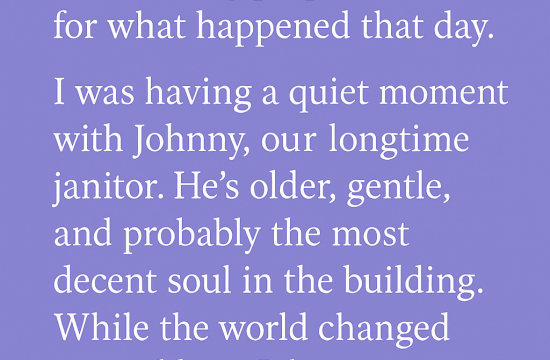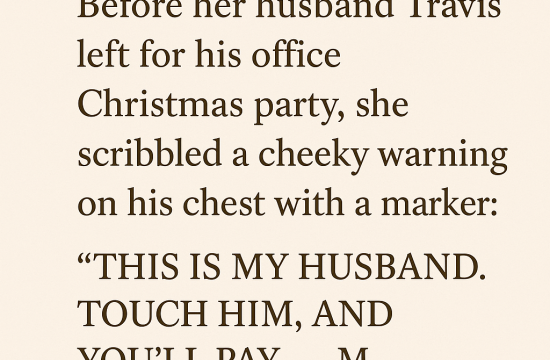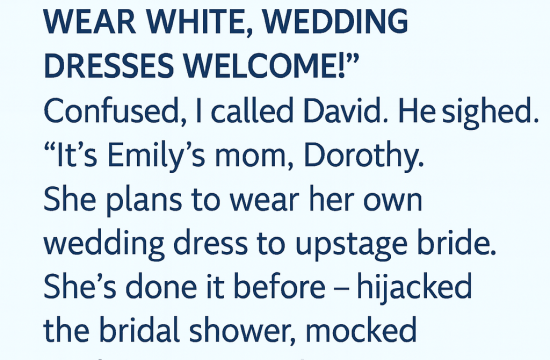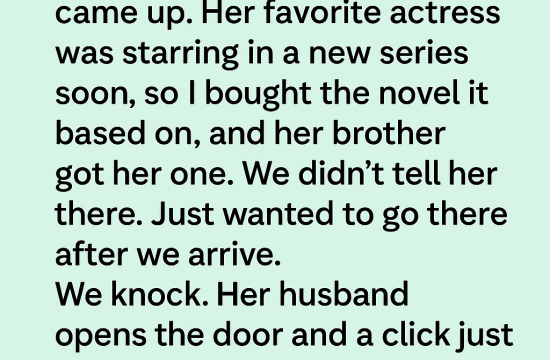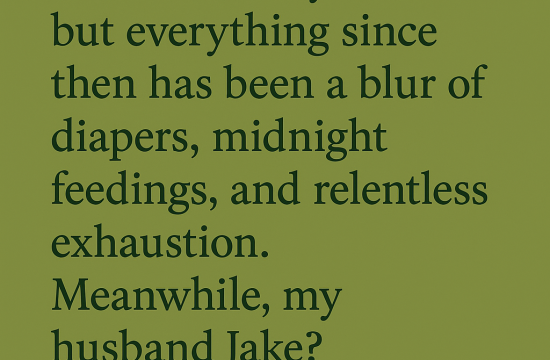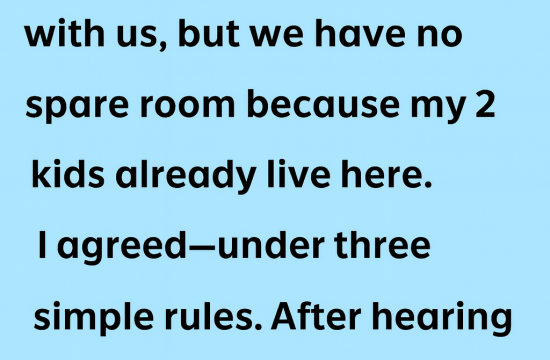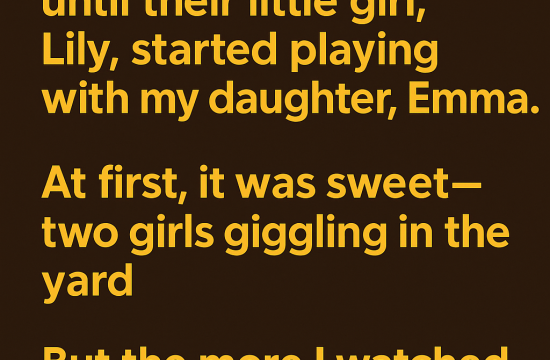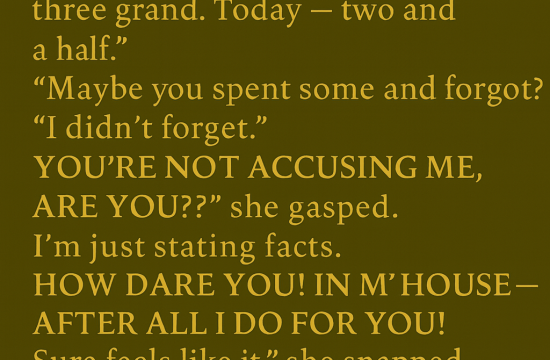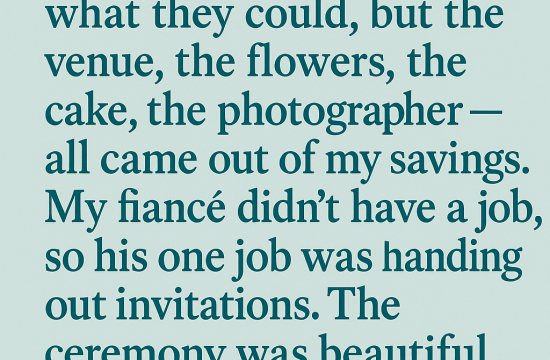Growing up in Millbrook felt like living in two different worlds, even though Sarah and I sat in the same worn-out classrooms for twelve years.
She lived in the big white house by the lake with her grandparents—a place with wide porches, blue shutters, and the smell of cinnamon drifting from the kitchen every Sunday. I lived on the far end of town in a faded trailer whose thin walls groaned every winter. We knew each other’s names, sure, but our lives moved in different orbits. We didn’t mix.
“You remember Sarah from high school?” my mom asked one day over the phone. I was in Chicago then, swallowed by 60-hour workweeks at a marketing firm.
“She’s working at the hospital now. Such a sweet girl.”
I nodded politely and moved on. I hadn’t thought about Sarah in years—until Dad’s diagnosis dragged me home overnight. Pancreatic cancer. Aggressive. Unforgiving. Chemo treatments that left him frail and exhausted. I spent long hours sitting beside him at Millbrook General.
That’s where I saw her again.
“Liam?” she said, glancing up from Dad’s chart, her brown hair escaping a messy ponytail, her eyes just as kind and steady as I remembered.
“Small world,” I said.
“Or small town,” she laughed.
That brief reunion turned into coffee after her shift. Coffee turned into dinners. Dinners turned into slow walks by the lake where she grew up. Before long, I was driving home every weekend—not just for Dad, but for her. Always for her.
When Dad finally rang the bell after his last treatment, I was faced with a choice: go back to Chicago or stay in Millbrook with Sarah.
“I’m not giving anything up,” I told my friend Mike when he questioned my decision. “I’m choosing something better.”
Six months later we moved into a small rental together. Sarah’s laugh filled the kitchen while I worked remote from a little corner desk. We whispered dreams late at night—kids, travel, a house we’d make our own.
One night she said softly, “I still dream about my grandparents’ old house. Sitting on the porch, watching our kids play in the lake. Silly, huh?”
“Not silly at all,” I said, tucking that longing deep inside my heart like a promise.
She told me how her aunts and uncles sold the place after bitter inheritance fights. How the new owners painted it yellow. “Grandma would’ve hated it,” she whispered.
Months later, I proposed on the dock where we first opened up to each other. She said yes before I even finished the question.
That’s when I started planning the surprise.
Three months before our wedding, the yellow house went up for sale. I didn’t hesitate—not for a second. I called the realtor from my desk at lunch, drained my savings, maxed my cards, begged my parents not to contribute, and lost that argument.
“This is what you do for love,” Mom said, signing the check.
Every weekend, I drove out there alone—sanding, painting, replacing the yellow with the original white, reinstalling blue shutters, restoring everything she remembered. Dad helped on the days he felt strong enough, leaning on the porch rail we’d just fixed, smiling weakly.
“She’s going to cry happy tears,” he said.
I imagined her face when I handed her the keys at our rehearsal dinner, surrounded by everyone we loved. I imagined the life we’d build there—the holidays, the babies, the quiet mornings on the water.
But that moment never came.
Sarah kissed me goodbye before her bachelorette trip to Miami. “Just the girls,” she said. “I’ll miss you.”
I stayed behind, finishing up the house. Polishing floors. Planting hydrangeas. Putting together a home meant for our future.
When she came back, something in her had changed—subtle, but unmistakable. She smiled less. Laughed less. Stared at her phone like it held secrets. Flinched when it buzzed.
“Everything okay?” I asked one night.
“Just tired,” she whispered, eyes darting away.
Two weeks later, she sat at our kitchen table with tears streaking down her cheeks.
“I can’t do this, Liam. I can’t marry you.”
My world blurred. “What? Why? What happened?”
“I—I don’t know. I’m scared. I’m confused. I need… time.”
“Then let’s postpone.”
She shook her head, eyes hollow. “No. I’m so sorry.”
Mutual friends whispered later that her old high school boyfriend, Jake, had been in Miami that same weekend. A coincidence, they insisted. Sarah never mentioned him—not once.
Three weeks later she moved to Florida. Six months after that, Facebook showed me what she didn’t: Sarah and Jake barefoot on a Key West beach, exchanging vows while the sun set behind them.
The house I’d bought for love stood empty.
For weeks, I couldn’t even drive past it without feeling my ribs tighten. But I couldn’t sell it either. Every corner held echoes of a future I’d built alone.
So I moved in.
I hung photos, bought furniture, planted a garden. I let the silence wash over me until it no longer hurt. Slowly, the house became mine—not a monument to what I’d lost, but a sanctuary for who I was becoming. I hosted barbecues, birthdays, Fourth of July picnics on the dock. I lived. I healed.
Three years passed. I believed I’d closed that chapter.
Until one crisp Saturday before New Year’s when Sarah’s mother and sister walked up my driveway.
Inside, they ran their hands along the bannisters, the shutters, the restored porch rail.
“You’ve made it look exactly like it used to,” her sister whispered.
Then her mother cleared her throat. “We want to buy it back… for Sarah. We’ll pay above market value.”
I stared at her. “It’s not for sale.”
“She doesn’t know we’re here,” her mother continued. “But she drives by sometimes. This house… it could help her heal.”
“I’m sorry,” I said gently. “But this is my home now.”
Three days later, my phone lit up with a message from Sarah herself.
“You’re really going to be petty about this? You bought MY house just to keep it from me. My family’s right—you’re punishing me for leaving.”
I froze. That was the moment I realized she didn’t know. She never did.
“I’m not keeping anything from you,” I typed back. “This is my home.”
“Sell it to us,” she wrote. “Don’t make this harder than it needs to be.”
“No.”
By evening, the internet was full of posts—half-truths and dramatic claims about a heartless ex-fiancé who stole a woman’s family legacy. Neighbors whispered. Strangers judged.
But none of them knew the truth:
I didn’t buy that house to hurt her.
I bought it because I loved her.
And when she left, that house—the one I rebuilt piece by piece—became the only thing that saved me.


